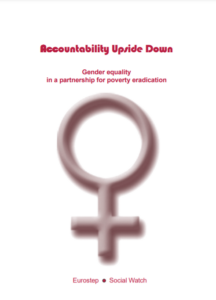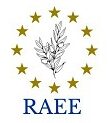Author: Mirjam van Reisen with the assistance of Maxi Ussar
Project Coordination: Camilo Tovar (EEPA) Karina Batthyány (Social Watch)
Research – Barbara Ann Delcourt, Ben Moore, Camilo Tovar, Karina Batthyány, Maxi Ussar
Year: February, 2005
Language: English
Published By: Eurostep & Social Watch

Summary
The World Summit for Social Development (WSSD) held in 1995 marked the first time that the goal to eradicate poverty was endorsed. This goal is also the first of the eight Millennium Development Goals (MDGs). The WSSD also established a clear and inextricable link between poverty eradication and gender equality.
In the same year, 189 governments gathered together and adopted the Beijing Platform for Action. The Platform also recognizes the crucial link between gender equality and poverty eradication. In 2000, governments signed the Millennium Declaration, a document that also considers gender equality in the context of eradicating poverty and as a fundamental aim in itself.
The implementation of both sets of commitments – the Beijing Platform and the MDGs – is being reviewed in 2005. As they each have a different focus – the Beijing Platform for Action being firmly rooted in women’s rights, while the Millennium Declaration specifically concentrates on eradicating poverty, there is a considerable risk that these review processes will be irrevocably separated. This report argues that the two processes must be linked as the ten-year review of the Beijing Platform for Action provides a major input into the review of the Millennium Declaration and the Millennium Development Goals. The report specifically makes the link with MDG 8 – advocating a global partnership to eradicate poverty – and highlights the need to bring the well-established connection between poverty eradication and gender equality to the centre of that partnership.
The report then assesses to what extent the commitments and obligations to gender equality have been concretely implemented within the context of international efforts for poverty eradication. The report takes a sample of nine bilateral donors – Canada, the European Community, France, Germany, Japan, the Netherlands, Sweden, the United Kingdom and the United States. These were selected on the basis of their size and their expected position in relation to gender. The report examines how these donors have operationalized their commitments in their development policies over the last five years and assesses the implementation of their aid programmes in 2003.
